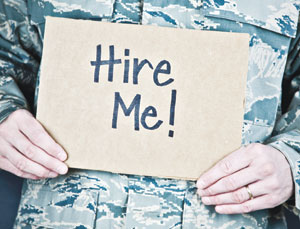 The skills and experience you have gained as a member of the military are extremely valuable to employers and important in today?s workplace. However, you have been immersed in the culture of the military, and may have difficulties explaining your skills to a prospective employer in a way they can understand. Here are some tips you can use to translate your military experience into civilian employment:
The skills and experience you have gained as a member of the military are extremely valuable to employers and important in today?s workplace. However, you have been immersed in the culture of the military, and may have difficulties explaining your skills to a prospective employer in a way they can understand. Here are some tips you can use to translate your military experience into civilian employment:
- De-militarize your resume. Omit or re-phrase any jargon or abbreviations that are not common knowledge to civilians. If a potential employer can?t read your resume, they won?t consider you for the job.
- Pull marketable skills out of your experience?did you lead a team to accomplish an objective in a certain time frame with no room for error? This can translate to success in the civilian workplace.
- Present your expertise: is it leadership? Attention to detail? Adherence to deadlines? All of the above? These attributes are essential in the military and the workplace.
- Go into detail when explaining your technical skills. Many careers in the military translate into civilian careers. Experience with telecommunications, finance, mechanics, and medical care should all be included.
- Do not under-value your interpersonal skills. Communication is key, and as a service member you have interacted with peers, subordinates, and supervisors. The ability to get along with many people is important and speaks volumes about your personality and professionalism.
- Obtain a copy of your Verification of Military Experience and Training Document (VMET) which lists your training and experience that may be applied to your work in the private sector, in addition to college credit information.
- Make time to attend a seminar presented by the Transition Assistance Program. These seminars help veterans make informed decisions about education and employment.
Transitioning to a Civilian Workplace
There is a culture gap that you will have to bridge when you enter the civilian workplace. To be successful, you should keep these differences in mind:
- Flexibility: Your hours and schedule may be more flexible than you expect.? Employees today have more of a work-life balance.
- Communication: Coming from the military, your style of communication may be more direct than civilians are accustomed to. Be patient and sensitive to their mindset. In time, you will adjust to each other.
- Efficiency: Many companies have bureaucratic decision-making processes that may not be as efficient as you?d like. Additionally, you may receive instructions from several different people as opposed to direct orders that come from the top down. Again, be patient and respect their way of doing business.
Source: http://militaryfamily.com/2012/11/07/applying-military-experience-to-civilian-employment/
howard johnson blackhawks levon helm firelight world peace elbow kevin love think like a man
কোন মন্তব্য নেই:
একটি মন্তব্য পোস্ট করুন